Para los lectores hispanohablantes: Este artículo es el primero en inglés sobre temas Mozilla que creo pueden interesar al resto de comunidades de habla no hispana, intentaré hacer con tiempo sus versiones en español si son interesantes. Puedes ver la versión en español de este artículo.
Organizing a Mozilla community can be easy when you are a small group or can be a headache if you have more contributors than you can handle.
In the past year, Mozilla Hispano community has grown both contributors and ongoing projects, so we have been to learn how to handle from a small group to nearly 40 people.
Everything is more less easy to handle when your community is 4 or 5 people, each one usually does a different task, you normally focus on localization/user support and you just use email or a mailing list to communicate each other. The problem starts when you grow and new people wants to do different things like engagement, marketing, PR, QA…
I’m going to explain how we’ve solved it in Mozilla Hispano and I hope that could be an example to other communities in the future.
Our infrastructure is based on:
- Meritocracy: Core and casual contributors.
- Open mailing list to announce new projects.
- A page where we explain where you can contribute and how.
- A mentorship program.
- A wiki to organize areas, projects, tasks, events, meetings and contributors.
- A mumble audio server to do audio conferencing.
- An irc channel at irc.mozilla.org.
Meritocracy
The community rules (es) are clear and accepted by everybody from the beginning. We are a meritocracy like the rest of Mozilla and we are divided on:
- Users: Anyone who visits the site.
- Casual contributors: Users that contribute to the community from time to time in different projects.
- Core contributors: A casual contributor that has been participating actively for at least 6 months could be proposed as a core contributor or member. He will have rights to vote in the internal decisions that could be made in the community. If you are going to be inactive or you stop contributing you will be again a casual contributor.
- Mentors: Special category for well know contributors that want to help newcomers to get into the community.
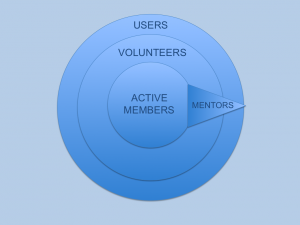 Mailing list
Mailing list
It’s hosted on google groups but in the future should be migrated to Mozilla’s mailman. Subscriptions are open, it’s the first way to introduce yourself to the community and keep updated about what’s going on. It’s also the place for discussion about new ideas or problems.
People are encouraged to send emails to the list using a tag for better organization:
- [News] Firefox 9
- [Engagement] DeMo project
- [Support] Check unsolved posts
Contribute page
The contribute page it’s the main page for newcomers. It’s designed to first point people to the mentorship program (es), ongoing-future projects listing page (es) and resources for contributors (es) and then list all areas we are working on.
Mentorship program
In the mentorship program page we briefly explain what Mozilla Hispano is and our Mozilla values (we don’t want people to misunderstand that we are a meritocracy and have problems in the future). Then we list by area, the names and emails of mentors and we encourage to mail them directly.
We’ve found that one to one contact with people is better to explain how we work and what they can do. We want mentors to be very active, assigning or creating projects to keep new people active from the beginning.
Projects page
From it you can get and overview about what’s going on now and in the future. More about this later.
Resources for contributors
This page lists every tool we use, how to sign up for the mailing list, how to create an account on our wordpress to post articles, our planet, social networks, irc, events, audio server or how to create content on the wiki.
A wiki to organize them all
Since the beginning of the project, we’ve been using the wiki as a tool to list how we work and list contributors, but the «static» approach we’ve been using was not enough once we get dozens of new contributors. Following Mozilla Reps wiki organization we improved our mediawiki installation using semantic data: Semantic Mediawiki and Semantic Mediawiki Forms. Using these tools we can have information shared between wiki pages.
Profile page
Once a new contributor creates an account on the wiki, he can fill his profile information such as name, photo, country, areas where he wants to contribute, email, website, twitter… Mozilla is about people and we want everyone to know this when they visit our page.
This is a very important page to track everyone working on the community because this page will automagically fetch all projects, events, meetings, and pending task this users has.
Areas
We try to mimic Mozilla’s division: News, User support, Labs, Engagement, QA and IT. This is what we like to call «A small Mozilla inside Mozilla».
Each area has a core contributor in charge to organize it and guide people interested in contributing to the area.
Projects
Every initiative is a new project, from «Localizing AMO» to «Improve site design» or «Tips and tricks for beginners». Anyone can create a new project from the listing page using a easy form.
Each project has a coordinator, an area where it belongs, status (inactive, active, finished), a list of people helping on it (anyone can add himself to the list), aim, subprojects (if needed), meetings (more about this later), pending tasks and free text to describe the status or any other links and information about it. Projects are listed on their area page to give them visibility.
Tasks
Any area or project can have tasks (es), a small work that has to be done assigned to a contributor. We don’t need a big infrastructure like bugzilla for these assignments.
Each task has a description, person in charge, due date and status. They are listed on their corresponding area/project page and also in the profile of the person in change of it. This last thing it’s very important because it’s a way to friendly remind people they have something to do 😉
You can subscribe to all task, area tasks, project tasks and/or your personal tasks via RSS to keep updated.
Meetings
For organizing a project we have the possibility of creating a meeting (es). The workflow is usually this:
- The project coordinator post a message on the mailing list announcing the meeting and asking people interested and preferred dates (most times using tools like doodle.com)
- Once the date is set, a meeting page is created with all the information and attendees. It will be automatically listed on meetings page, project page and attendees profiles.
- We use a mumble server for conferencing. We’ve found that using audio instead of just text on IRC is quicker and improves the personal relationships between contributors. Every meeting is recorded, uploaded and linked on its page.
- Notes about the conference are added to the meeting page and the link is announced on the mailing list.
- We use irc as back channel for sharing links and text during the conference. Chat log is also attached to meeting page.
Events
Event tracking (es) is also done on the wiki. Every event a community contributor attends should be listed here, even if it’s not organized by a mozillian. Dates, address, organizer, number of attendees, website and mozillian attendees are filled here so it will be auto-listed in every contributor profile page.
This is a great way to know where the community contributors are going to be and have information about Mozilla presence in these events.
Final notes
This is the way that works for us, and we think it could work for other communities. Following these procedure we have:
- Improved personal relationships between contributors.
- Everyone knows what’s going on and who is doing what.
- The ideas are no longer lost in a limbo of emails.
- Newcomers know where to go and who to ask to start contributing.
- New contributors have things to do since day one and their work is visible and public for the rest of the community.
And remember, the key for community growing is to get contributors with different profiles and encourage them, let them see they and their work are part of the community! Don’t focus your community just in localization, most people want to help with engagement, creation (music, video, images) or other creative topics, most future contributors will find you in social networks, be there and keep them updated!
Our presentation at Mozcamp 2011 Europe was a 10 minutes summary of this 😉
Question? Leave a comment, ping me on irc (Nukeador), Twitter or via email (nukeador at mozilla-hispano dot org).
As a bonus track, here you have the Mozilla Hispano talk about community organization at MozCamp Europe 2011:
Continue reading to next article: Organising a Mozilla community (II)
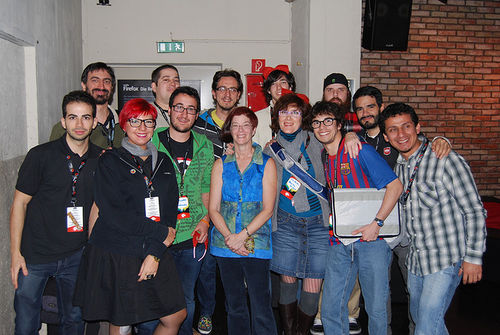
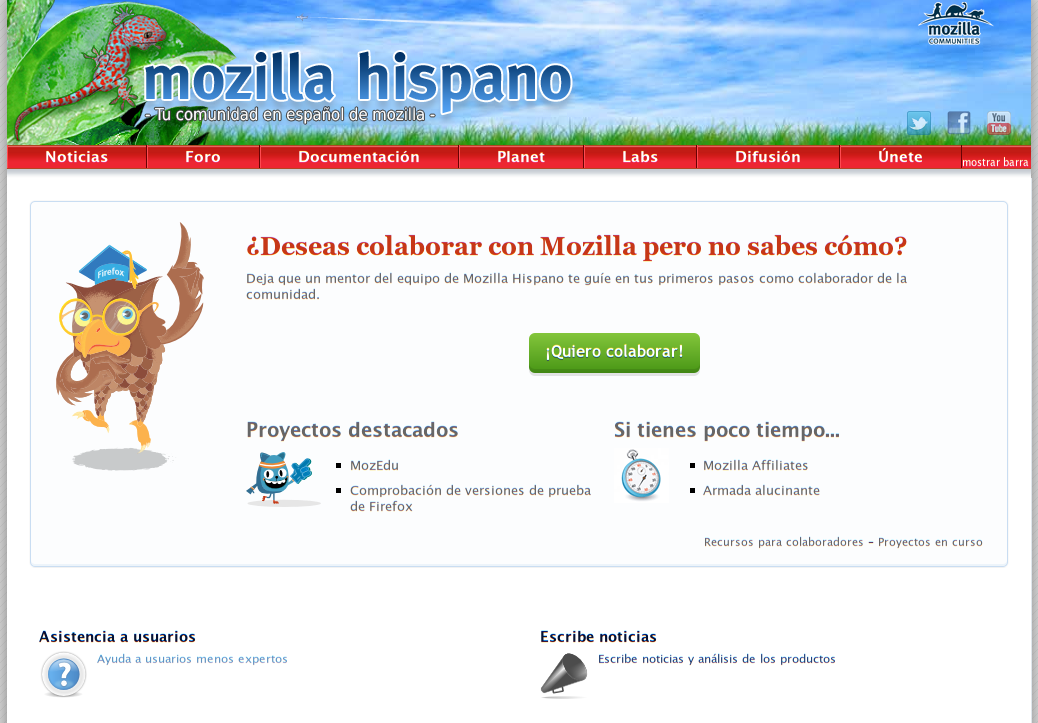
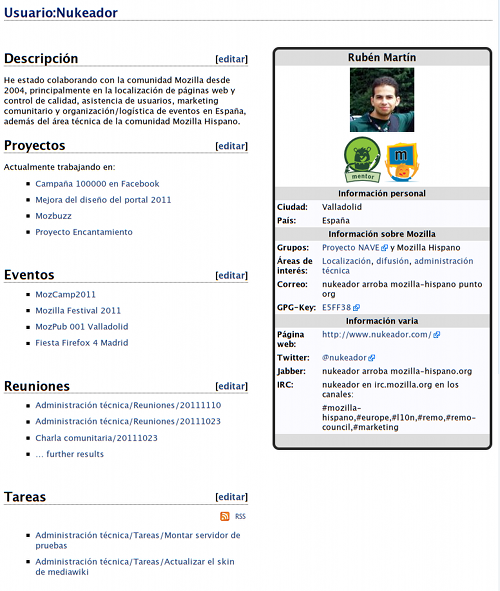
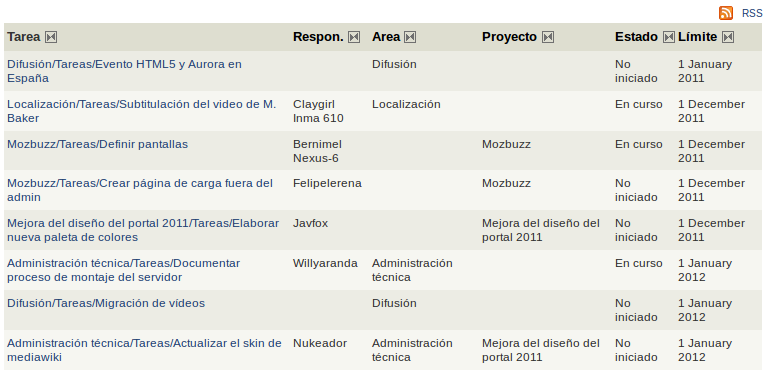
4 comments for “Organising a Mozilla community (I)”